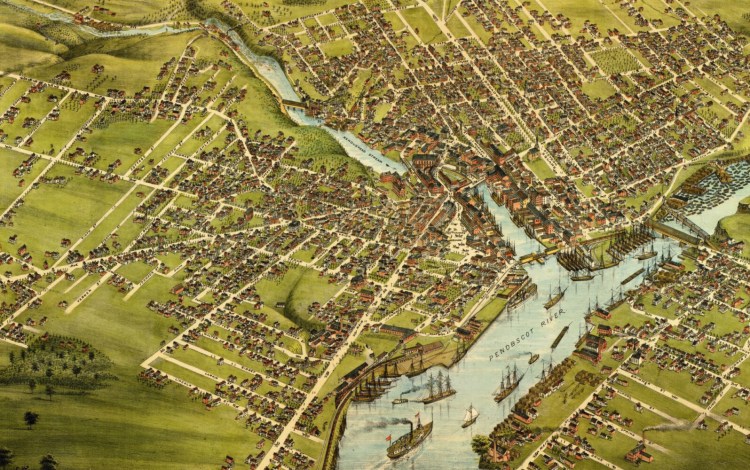June 1, 1840: The U.S. census begins and eventually will show that Bangor’s population has reached 8,627, a 201 percent increase from the 1830 total.
 The then-booming lumber town was incorporated as a city in 1834.
The then-booming lumber town was incorporated as a city in 1834.
June 1, 1849: Inventors, businessmen and identical twins Freelan Oscar Stanley and Francis Edgar Stanley are born in Kingfield.
After becoming wealthy through pioneering work in manufacturing and marketing dry-plate photography equipment, they turn their attention to transportation – partly because their factory in Watertown, Massachusetts, is next to a bicycle factory.
Francis Stanley’s wife, Augusta, tries riding a bike but finds that she keeps falling off, so her husband vows to devise something similar that would enable her to get around in comfort and safety. He produces a steam-driven automobile in 1897.
Its enthusiastic reception the following year at the Boston Auto Show prompts him and his brother to turn to making cars. Locomobile, a company they start and quickly sell, produces more than 200 steam-powered cars in 1898 and 1899, the most in the nation.

Arthur Holmes and Frank Holmes of San Jose, Calif., driving a Stanley Steamer along road in Yosemite Valley, July 26, 1900; second auto to drive into the valley. Image courtesy of the National Park Service
In 1899, Freelan Stanley and his wife, Flora, ride one to the top of New Hampshire’s Mount Washington. In the same year, he gives President William McKinley a tour of Washington in one of the vehicles, making McKinley the first sitting U.S. president to ride in a car.
In 1902 the brothers found the Stanley Motor Carriage Co.; its products become known as “Stanley Steamers” or “flying teapots.” After Francis Stanley dies in 1918 in a car accident, his brother sells his own interest in their car company. Overtaken by technological improvements in cars powered by internal combustion engines, the Stanley company ceases production in the 1920s.
Freelan Stanley plays a significant role in the 1915 creation of Rocky Mountain National Park and the development of the community of Estes Park in Colorado. He builds the Stanley Hotel in Estes Park. The hotel later becomes the inspiration of and the setting of Stephen King’s novel “The Shining.”
June 1, 1950: U.S. Sen. Margaret Chase Smith (1897-1995), a Republican from Skowhegan, delivers what later becomes known as her “Declaration of Conscience” speech on the Senate floor, chastising key Republican leaders for the tactics they employ in trying to root out Communists in U.S. government. Smith upholds Americans’ right to criticize their government and to protest against its actions.

Sen. Margaret Chase Smith, R-Maine, walks in the Capitol plaza with the Capitol in the background on June 14, 1950, in Washington, D.C. Associated Press/Herbert K. Smith
The speech is regarded widely as a stand particularly against powerful U.S. Sen Joseph McCarthy (1908-1957), a Republican from Wisconsin, from whose name the campaign against communists becomes known as “McCarthyism.” Six other Republican senators support Smith’s declaration, prompting McCarthy to label the group “Snow White and the Six Dwarfs.” For years afterward, McCarthy tries, mostly unsuccessfully, to undermine Smith’s political career.
Smith’s declaration is re-enacted by actress Patricia Neal in the 1977 made-for-TV biographical movie about McCarthy, “Tail Gunner Joe.”
June 1, 1978: A state law, commonly known as the Bottle Bill, requiring that consumers pay a deposit on all soft drink, beer, wine cooler and mineral water containers takes effect in Maine.
Proponents of the Bottle Bill cited the need to reduce litter, an increasing problem because of the growing use of disposable containers in the marketplace. After a heated campaign in 1976, voters approved a referendum in support of the deposit law, 58 percent to 42 percent.
The law is expanded in 1990 to include other types of beverage containers.
Presented by:

Joseph Owen is an author, retired newspaper editor and board member of the Kennebec Historical Society. Owen’s book, “This Day in Maine,” can be ordered at islandportpress.com. Joe can be contacted at: jowen@mainetoday.com.
Send questions/comments to the editors.



Success. Please wait for the page to reload. If the page does not reload within 5 seconds, please refresh the page.
Enter your email and password to access comments.
Hi, to comment on stories you must . This profile is in addition to your subscription and website login.
Already have a commenting profile? .
Invalid username/password.
Please check your email to confirm and complete your registration.
Only subscribers are eligible to post comments. Please subscribe or login first for digital access. Here’s why.
Use the form below to reset your password. When you've submitted your account email, we will send an email with a reset code.